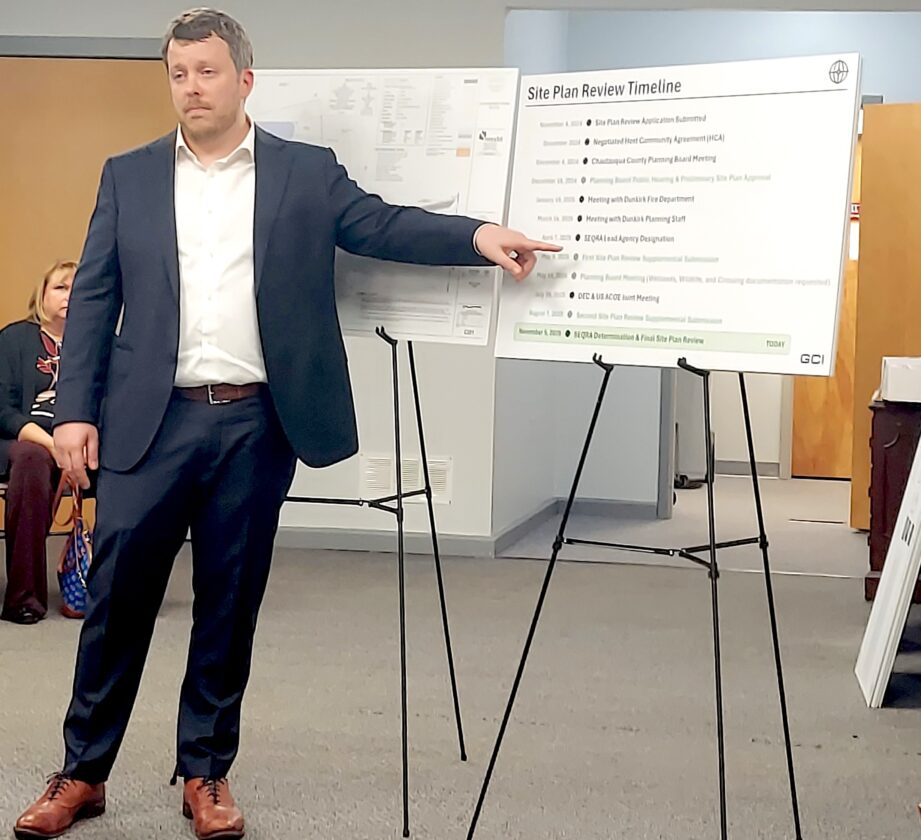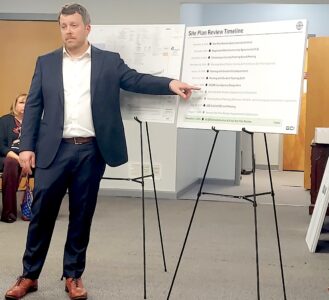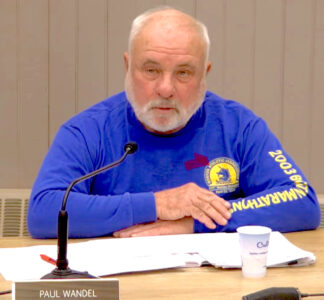City energy storage plan moves ahead

OBSERVER Photos by M.J. Stafford Daniel Brennan of GCI Energy describes the company’s plan for a Battery Energy Storage System in the city of Dunkirk at a Dunkirk Planning Board meeting.
The Dunkirk Planning Board made a couple of important approvals on a proposed Battery Energy Storage System (BESS) last week, though the project is still years from construction.
At the end of what had to have been one of the longest meetings ever at City Hall, the board approved a declaration of negative impact in a State Environmental Quality Review (SEQR) of the project. The Planning Board then approved a site plan.
Both of the votes were 4-1, with Ed Schober opposing. Schober advocated for a moratorium on BESSs in the city, similar to what has been done recently in some nearby communities.
However, as he pointed out, that is beyond the Dunkirk Planning Board’s powers. That would have to be done by the Common Council.
The SEQR and the site plan approvals are both subject to numerous conditions. Among them, the Chautauqua County Planning Board will have to approve both the site plan and the SEQR.

Executives from GCI Energy look on with interest as Dunkirk Planning Board members including John Mackowiak (left) and Ed Schober debate a Battery Energy Storage System proposed by GCI for the city.
The Dunkirk Planning Board spent nearly five hours on the project last week, debating it at length and going over every point on the lengthy SEQR checklist.
That came after a 75-minute presentation by project planners GCI Lighthouse Energy. The outfit wants to put the BESS in a wooded area west of Brigham Road.
With millions in potential revenue on the line, GCI put on a full-court press to get the Dunkirk planners’ approval last week. The description is apt because they sent a basketball team’s worth of players to Dunkirk: four company executives and Daniel Murray, a consultant who was there specifically to talk about fire safety issues. Murray is a retired FDNY battalion chief who was in charge of the department’s hazardous materials operations.
Daniel Brennan, GCI’s top attorney, did most of the talking. Brennan first offered a “quick refresher” on the project, noting that the proposed site is near large transmission lines and a railroad right-of-way. A BESS array is also a permitted use for the area under city zoning code, he stated.
“The question is not whether battery storage is appropriate, but whether the site plan is appropriate,” Brennan declared. His tone for the presentation resembled that of a lawyer trying to convince a jury in a court case.
Brennan said the BESS off Brigham Road would store about 250 megawatts, or enough electricity to power 250,000 homes for four hours each. He made a comparison with the mothballed NRG plant, stating that it produced 600 megawatts.
The development would cover about 18 acres, with around 11 acres actually used for BESS arrays. “It’s very compact for the benefits you get,” stated Brennan, claiming that about 2,000 acres of solar panels would be needed to generate the amount of electricity the Dunkirk BESS would store.
Brennan moved to a placard showing those benefits Dunkirk would allegedly get. The project will help the city electrical grid, is environmentally friendly and will provide economic benefits, he and the placard said.
“There will be no pollution whatsoever caused by this project,” he said.
As for economic benefits, he showed a placard revealing a proposed Payment In Lieu of Taxes agreement over 25 years which would add about $1 million annually into the city’s revenue.
Brennan emphasized the remoteness of the proposed location in a wooded, undeveloped area. “No one will know it’s there so it won’t have any impact on aesthetic resources,” he said.
Murray stated that New York City has 15 BESS projects operating or underway, with no problems. “We wanted to make sure we did it right,” he said.
Murray said that he and GCI would work with local first responders on an emergency response plan for Dunkirk’s BESS. A day of training, including a site walk-through, would be offered and paid for by the company.
Schober was skeptical of the whole thing. “A lot of this is based on zoning, one (zoning) officer’s interpretation who is no longer with the city,” he said. Board members pointed out that the city is currently going through a rezoning process.
“We need some legal assistance to maneuver some of these things, that’s expertise we don’t have right now,” Schober said of GCI’s proposal.
He declared that “an effort is being made to skirt around some things,” calling it “deceiving.” Schober called for a moratorium on BESSs in the city.
He and other Planning Board members stated city residents should be brought into the process, calling for public hearings on the project.
“It’s not that we’re trying to stonewall. From what I’ve looked at, you’ve complied with everything,” said Planning Board member Frank Torain, who was elected to a Common Council seat the previous day. Instead, the Planning Board must be absolutely sure it is complying with every requirement, because the project will affect the entire community.
“I don’t want to stick my neck out on the line… unless we have everything right,” Torain said.
“They have addressed a lot of our concerns,” said Dunkirk Fire Chief Nick Barter.
The current estimated groundbreaking date for the project is not until the middle of 2028. It would start operations sometime in 2030.
With such an extended time frame, Torain wondered, “Why are we busting our backs to go through all this?”
GCI had an easy answer for that: it wants to get some money from New York state as part of Albany’s push of alternative energy options. The state is awarding contracts in the first quarter of 2026 for projects in 2030, and GCI wants its Dunkirk project to get in on that.
- OBSERVER Photos by M.J. Stafford Daniel Brennan of GCI Energy describes the company’s plan for a Battery Energy Storage System in the city of Dunkirk at a Dunkirk Planning Board meeting.
- Executives from GCI Energy look on with interest as Dunkirk Planning Board members including John Mackowiak (left) and Ed Schober debate a Battery Energy Storage System proposed by GCI for the city.






